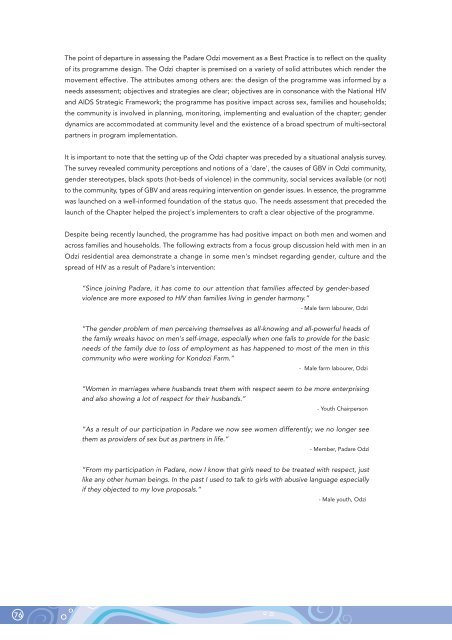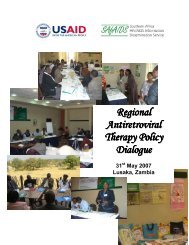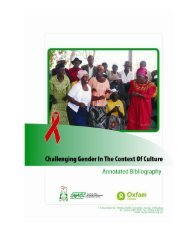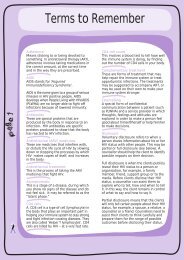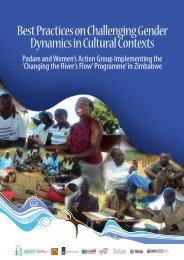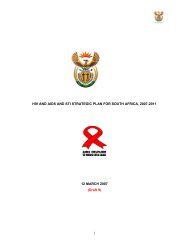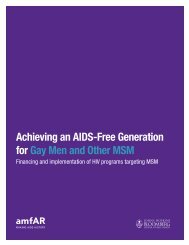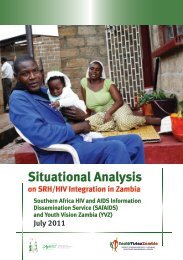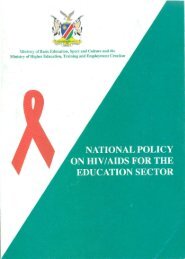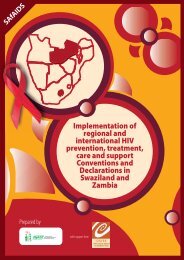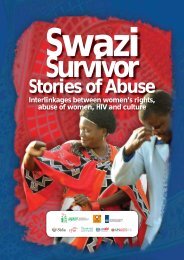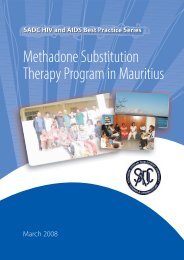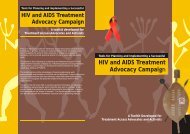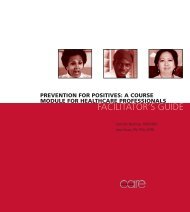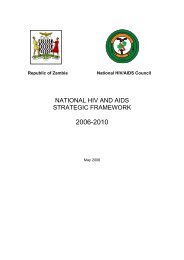Zimbabwean stories of "Best Practice" - SAfAIDS
Zimbabwean stories of "Best Practice" - SAfAIDS
Zimbabwean stories of "Best Practice" - SAfAIDS
Create successful ePaper yourself
Turn your PDF publications into a flip-book with our unique Google optimized e-Paper software.
The point <strong>of</strong> departure in assessing the Padare Odzi movement as a <strong>Best</strong> Practice is to reflect on the quality<strong>of</strong> its programme design. The Odzi chapter is premised on a variety <strong>of</strong> solid attributes which render themovement effective. The attributes among others are: the design <strong>of</strong> the programme was informed by aneeds assessment; objectives and strategies are clear; objectives are in consonance with the National HIVand AIDS Strategic Framework; the programme has positive impact across sex, families and households;the community is involved in planning, monitoring, implementing and evaluation <strong>of</strong> the chapter; genderdynamics are accommodated at community level and the existence <strong>of</strong> a broad spectrum <strong>of</strong> multi-sectoralpartners in program implementation.It is important to note that the setting up <strong>of</strong> the Odzi chapter was preceded by a situational analysis survey.The survey revealed community perceptions and notions <strong>of</strong> a 'dare', the causes <strong>of</strong> GBV in Odzi community,gender stereotypes, black spots (hot-beds <strong>of</strong> violence) in the community, social services available (or not)to the community, types <strong>of</strong> GBV and areas requiring intervention on gender issues. In essence, the programmewas launched on a well-informed foundation <strong>of</strong> the status quo. The needs assessment that preceded thelaunch <strong>of</strong> the Chapter helped the project's implementers to craft a clear objective <strong>of</strong> the programme.Despite being recently launched, the programme has had positive impact on both men and women andacross families and households. The following extracts from a focus group discussion held with men in anOdzi residential area demonstrate a change in some men's mindset regarding gender, culture and thespread <strong>of</strong> HIV as a result <strong>of</strong> Padare's intervention:“Since joining Padare, it has come to our attention that families affected by gender-basedviolence are more exposed to HIV than families living in gender harmony.”- Male farm labourer, Odzi“The gender problem <strong>of</strong> men perceiving themselves as all-knowing and all-powerful heads <strong>of</strong>the family wreaks havoc on men's self-image, especially when one fails to provide for the basicneeds <strong>of</strong> the family due to loss <strong>of</strong> employment as has happened to most <strong>of</strong> the men in thiscommunity who were working for Kondozi Farm.”- Male farm labourer, Odzi“Women in marriages where husbands treat them with respect seem to be more enterprisingand also showing a lot <strong>of</strong> respect for their husbands.”- Youth Chairperson“As a result <strong>of</strong> our participation in Padare we now see women differently; we no longer seethem as providers <strong>of</strong> sex but as partners in life.”- Member, Padare Odzi“From my participation in Padare, now I know that girls need to be treated with respect, justlike any other human beings. In the past I used to talk to girls with abusive language especiallyif they objected to my love proposals.”- Male youth, Odzi76


